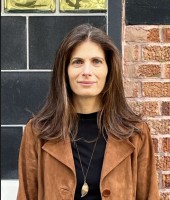Nitsan Chorev
Nitsan Chorev is the Harmon Family Professor of Sociology and International and Public Affairs at Brown University in Providence. Among other positions, she was a fellow at the Center for Advanced Study in the Behavioral Sciences at Stanford University, at the European University Institute, at the Institute for Advanced Study in Princeton, at the Woodrow Wilson International Center for Scholars, and at the UCLA International Institute.
She specializes in global political economy, on issues ranging from trade, health, industrial production and technology. In addition to numerous articles and other publications, she is the author of three books: Give and Take: Developmental Foreign Aid and the Pharmaceutical Industry in East Africa (Princeton University Press, 2020), The World Health Organization between North and South (Cornell University Press, 2012), and Remaking U.S. Trade Policy: From Protectionism to Globalization (Cornell University Press, 2007). She is currently conducting research on the relations between the high-tech industry, the military and the state in Israel.
Nitsan Chorev joins the Paris IAS in January 2026 for a one-month writing residency.
Research topics
Sociology; political economy; state theory; technology; high-tech; military.
Wars Make Markets, Markets Make Wars: For A New Macro-Sociology of Violence
Our sociological understanding of modernity, the state, and violence has been greatly shaped by Max Weber's definition of the state as “a human community that successfully claims the monopoly of the legitimate use of physical force.” Norbert Elias similarly identified and traced the "centralization and monopolization of the use of physical violence and its instruments." This project develops a macro-sociology of violence that questions this taken-for-granted state centralization and more accurately depicts the relations between violence and the state, and by extension, the relations between the state and the market, when violence is decentralized and commodified. The research draws on the case of military-industrial relations in Israel.
Based on ongoing research on cyberweapon and other private arms companies that have emerged in Israel since the 1990s, the project describes circular relations in which "wars make markets, markets make wars." It analyzes how various state-led means of support—including the "leakage" of technological knowledge, R&D funding, procurement, and loose export licensing—created and shaped the tech industry in Israel. In turn, the project analyzes how markets have shaped military technologies and, to a much greater extent than is recognized, have shaped how and why states fight wars. Many privately-owned technologies developed under "surveillance capitalism" are weapons that are sold in the global private market, clearly indicating that states do not hold a monopoly over the legitimate use of violence. The leakage of military technologies to the private market also leads to extreme market inequalities that are greatly responsible for the social bifurcation in Israel. Private actors can use their weapons against the state as well, forcing consideration of the relations between the state and illegitimate uses of violence. In Israel and elsewhere, then, military-tech relations greatly shape economic, social, and political orders. In On Violence, Hannah Arendt wrote, "The means used to achieve political goals are more often than not of greater relevance to the future world than the intended goals." In Modernity and the Holocaust, Zygmunt Bauman showed that mass extermination was made possible by modern technologies. Indeed, Elias himself emphasized the fragility of the social pacification process, which, as in Nazi Germany, could enter a "decivilizing downswing." The goal of this paper is to develop a theoretical understanding of the role of current market-driven technological weapons in such "decentralizing" and possibly "decivilizing" processes and thereby offer a new understanding of both violence and the state.
Key publications
Nitsan Chorev. "The political economy of surveillance-for-hire”. Frontiers in Sociology Colloquium Series, 2025.
Nitsan Chorev. “The Virus and the Vessel Or: How we Learned to Stop Worrying and Love Surveillance”. Socio-Economic Review, 19(4): 1497-1513, 2021.
Nitsan Chorev. "Give and Take: Developmental Foreign Aid and the Pharmaceutical Industry in East Africa". Princeton University Press, 2020.
|
|
|
|
|
|

